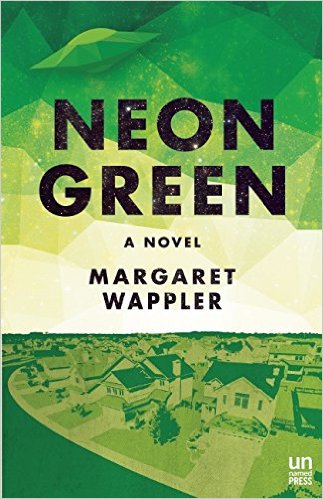 Neon Green by Margaret Wappler
Neon Green by Margaret Wappler
Most any reader can come up with a circumstance in which descriptions cannot do a novel justice. When I was asked to review Margaret Wappler’s Neon Green, I was told it had aliens and environmentalists and cancer, and I took the book with one eyebrow raised. Now, in all fairness, this book possesses all three of those things in ample supply. But I have not regretted taking the book for an instant. Neon Green is not science-fiction adventure, or science-fiction horror, or a morality tale on the treatment of the planet. At its heart, the novel is a questioning of beliefs, of self-importance, and of our multitudinous blind spots.
The strength of this novel lies in its use of little absurdities to camouflage the poignant realism at its heart. The presence and occasional perspective of the aliens are jarring interruptions to the mundane lives of the Allen family. The agreement between the federal government and the aliens to allow visitation through sweepstakes is as ridiculous as it is random. The suddenness of Cynthia’s cancer and its lack of concrete explanation seem to be products of an author trying to create conflict for her characters. And yet none of these are true. Despite their self-absorption, the Allen family is forced to come to terms with the notion that they are part of a larger universe, and a universe that is not going to behave in patterns that they would find acceptable. Wappler sets the stage for some grand conspiracy reminiscent of that in “To Serve Man” by Damon Knight, but there is no forced payoff or glaringly obvious “aha!” moment. Everything may happen for a reason, but that reason is beholden to no one’s ability to understand it.
The commentary provided in this denied resolution is brilliant and powerful. It takes the Allens, especially Ernest, a long time to arrive at their understanding. Aliens have been visiting for some time and yet Ernest’s primary focus is about his involvement in the local Earth Day celebration. After Cynthia’s diagnosis, he becomes convinced that he is on the trail of, at best, a gross oversight, and, at worst, a terrible machination. Through his example, the reader is driven to think beyond their figurative and literal spheres of influence, to question their sense of self importance. Ernest’s quest to root out pretenders to the environmental cause and Gabe’s obsession with posers and quality musical tastes are biting critiques of what it means to be a “believer”, or an activist, or to have passions about a particular topic. They force readers to ask themselves where true dedication ends and using a cause for status begins.
In order to accomplish something like this while avoiding heavy-handedness or soap-box preaching, an author has to carefully weave the messages into the story in such a way that the reader only realizes what they have seen well after actually reading it. Wappler achieves this through fantastic control of language, scene, and pacing. The book opens with description that is extremely vivid and pregnant with commentary, but delivered in a tone that suggests sterile observation and a heightened sense of being watched. Then, without visible effort, it flows into an over-the-shoulder view of Ernest and his thought process, which describes the most mundane details with a nervous passion that are immediately telling about his character. This flow happens with stellar ease throughout the book, and it allows Wappler to introduce things, like alien visitation sweepstakes, in a way that causes the reader to do a satisfying double take. At the same time, Wappler breaks from several writing conventions to drive home the nature of the universe that she is describing. White space breaks happen right in the middle of scenes, with no indication of time or perspective change, emphasizing the futility of trying to contain events into narrative cause and effect. Ernest, the “hero” and protagonist, is continually denied an enemy that he can fight, or even an enemy that can regard him, and his attempts to create one only do him harm.
It is no easy feat to write something that is both simple in its delivery and yet vividly complex in its meaning, but Wappler has pulled it off. And in that very act, there is yet more commentary. The novel itself is an exercise in looking at the universe not from the perspective of a protagonist from some grand, carefully plotted story, but from the point of view of one piece of a larger cosmos. It suggests that readers should take a moment, fight the instinct to take the familiar for granted, and appreciate the scale and depth of what lies around them. And while the novel fully acknowledges the fear and strain of such a change in understanding, it also delivers a taste of the awe and majesty on the other side.
Neon Green is available now through Unnamed Press.
